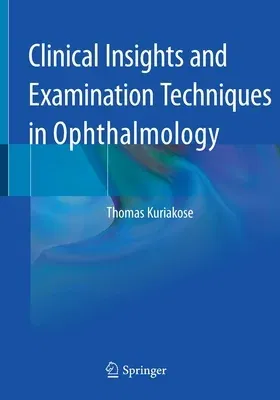Thomas Kuriakose
(Author)Clinical Insights and Examination Techniques in Ophthalmology (2020)Paperback - 2020, 14 June 2021

Qty
1
Turbo
Ships in 2 - 3 days
In Stock
Free Delivery
Cash on Delivery
15 Days
Free Returns
Secure Checkout

Print Length
241 pages
Language
English
Publisher
Springer
Date Published
14 Jun 2021
ISBN-10
9811528926
ISBN-13
9789811528927
Description
Product Details
Author:
Book Edition:
2020
Book Format:
Paperback
Country of Origin:
NL
Date Published:
14 June 2021
Dimensions:
25.4 x
17.78 x
1.4 cm
ISBN-10:
9811528926
ISBN-13:
9789811528927
Language:
English
Location:
Singapore
Pages:
241
Publisher:
Weight:
462.66 gm